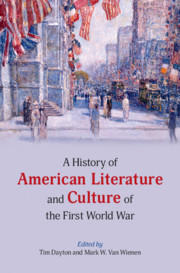Book contents
- A History of American Literature and Culture of the First World War
- A History of American Literature and Culture of the First World War
- Copyright page
- Contents
- Figures
- Contributors
- Acknowledgments
- Introduction America’s Great War at One Hundred (and Counting)
- Part I Genre and Medium
- Part II Settings and Subjects
- Part III Transformations
- Chapter 22 The Nation
- Chapter 23 Free Speech
- Chapter 24 Labor
- Chapter 25 The Veteran
- Chapter 26 The Military-Industrial Complex
- Chapter 27 The World
- References
- Index
Chapter 23 - Free Speech
“Clear and Present Danger”
from Part III - Transformations
Published online by Cambridge University Press: 23 January 2021
- A History of American Literature and Culture of the First World War
- A History of American Literature and Culture of the First World War
- Copyright page
- Contents
- Figures
- Contributors
- Acknowledgments
- Introduction America’s Great War at One Hundred (and Counting)
- Part I Genre and Medium
- Part II Settings and Subjects
- Part III Transformations
- Chapter 22 The Nation
- Chapter 23 Free Speech
- Chapter 24 Labor
- Chapter 25 The Veteran
- Chapter 26 The Military-Industrial Complex
- Chapter 27 The World
- References
- Index
Summary
To meet the challenge of mobilizing the nation for war in Europe, the Wilson administration took steps to silence dissent on the home front. In addition to a massive propaganda campaign to rouse public enthusiasm for the war, the government used the Espionage Act (1917) to silence anti-war publications and to arrest pacifists, political radicals, and others accused of making disloyal statements. The government’s campaign against dissenters was upheld in landmark decisions by the Supreme Court, supporting the imprisonment of hundreds of anti-war speakers, most notably the socialist leader Eugene V. Debs. While federal government repression encouraged similar laws at the state level as well as a wave of vigilante violence against pacifists and anti-war radicals, the arrests also led some free speech advocates to form the American Civil Liberties Union, one part of a wider campaign that sought amnesty for imprisoned dissenters.
Keywords
- Type
- Chapter
- Information
- Publisher: Cambridge University PressPrint publication year: 2021



